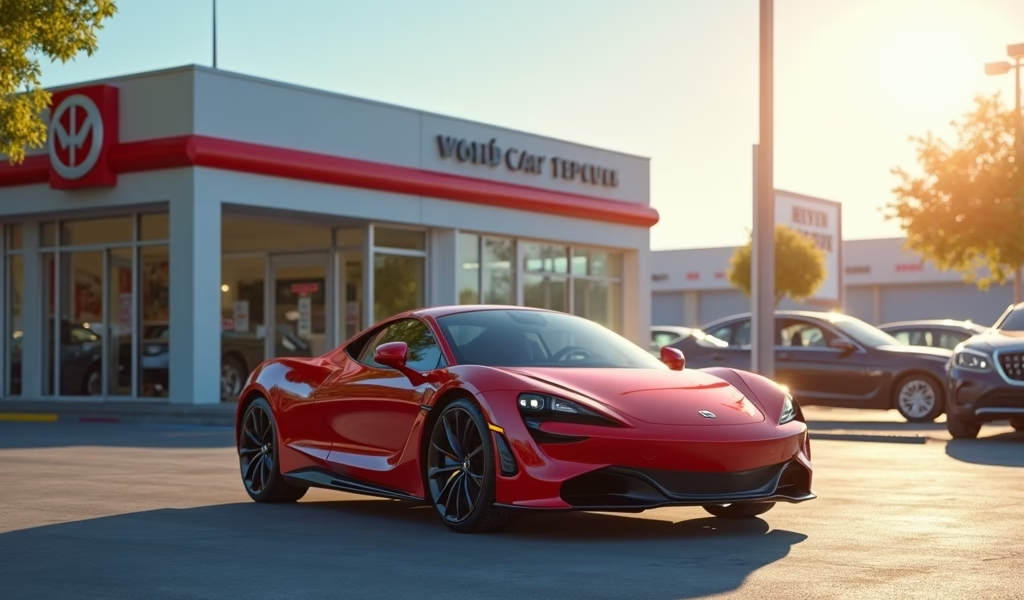Overview
This article examines the various options for buying used cars, comparing traditional dealerships, independent lots, online marketplaces, private sellers, and auctions based on price, convenience, risk, and buyer protection. The guide emphasizes that the best choice depends on individual priorities and recommends essential research tools including vehicle history reports, price comparison tools, and pre-purchase inspections regardless of where you buy.
Table of Contents
- Understanding the Used Car Marketplace
- Traditional Dealerships: Reliability with a Premium
- Independent Used Car Lots: Finding Hidden Gems
- Online Marketplaces: Car Buying in Your Pajamas
- Private Sellers: Direct Deals with Some Risks
- Car Auctions: High Risk, High Reward
- Choosing the Right Place Based on Your Needs
- Essential Research Tools for Any Purchase
- Conclusion
- Frequently Asked Questions
Understanding the Used Car Marketplace
Looking for a used car these days feels like trying to find your way through a maze blindfolded. With prices jumping all over the place and more buying options than ever, it’s tough to know where to start. As a mechanic who’s seen thousands of vehicles come through my shop, I can tell you that where you buy your car matters just as much as which car you choose.
The used car market has changed dramatically in recent years. According to Kelley Blue Book, the average used car now costs over $28,000 – that’s nearly the price of a new car just a few years ago! With that kind of money on the line, you need to know all your options.
I’ve helped countless customers inspect potential purchases from every type of seller out there. In this guide, I’ll walk you through each option to find the best way to buy a used car for your specific situation. Let’s pop the hood on the used car market and see what’s inside.
Traditional Dealerships: Reliability with a Premium

Traditional franchise dealerships are like the comfort food of car buying – familiar, reliable, but you’ll pay extra for that peace of mind.
Why People Choose Dealerships
The biggest advantage of franchise dealerships is their certified pre-owned (CPO) programs. As a mechanic, I respect these programs because they’re not just marketing fluff. For example, Toyota’s CPO vehicles undergo a 160-point inspection and come with a 7-year/100,000-mile powertrain warranty. That’s serious protection.
Dealerships also handle all the paperwork headaches for you. They’ll sort out financing, registration, and taxes – tasks that can be overwhelming if you’re doing them yourself. Plus, established dealers have fixed locations and reputations to maintain, making them accountable if something goes wrong.
The Downsides
The convenience of dealerships comes with a price tag. You’ll typically pay 10-15% more than private party sales for comparable vehicles. In dollars and cents, that’s often $1,500-3,000 more on a $20,000 car.
The sales environment can also be stressful. Many dealerships still use high-pressure tactics, and the experience can feel like psychological warfare for some buyers. I’ve had customers tell me they felt rushed into decisions they later regretted.
What to Look For
If you decide a dealership is right for you, do your homework first. Look for dealers with 4+ star ratings online and transparent pricing policies. Ask to see the full inspection report for any car you’re considering – a reputable dealer will have no problem sharing this.
Always clarify exactly what’s covered under any warranty offered. Some “powertrain warranties” exclude important components like turbochargers or electronic modules that can be expensive to replace.
Independent Used Car Lots: Finding Hidden Gems
Independent used car lots are the local diners of the car world – less polish than the big chains, but often with better prices and sometimes hidden gems on the menu.
The Appeal of Independence
Independent dealers typically offer better prices than franchise dealerships. From what I’ve seen in my years as a mechanic, you’ll save about 5-10% compared to franchise lots. They also tend to be more negotiable – I’ve seen customers haggle prices down by $1,000 or more with skilled negotiation.
Many independent dealers specialize in specific vehicles. There’s a lot near my shop that focuses exclusively on Toyota trucks, and the owner knows these vehicles inside and out. This specialized knowledge can be incredibly valuable.
Potential Pitfalls
Quality varies tremendously between independent dealers. Some are fantastic, run by car enthusiasts with high standards. Others are, frankly, looking to offload problem vehicles on unsuspecting buyers. According to the Federal Trade Commission, issues with independent dealers are among the most common consumer complaints they receive.
Warranties at independent lots are typically limited or non-existent. Many sell vehicles “as-is,” meaning you’re responsible for any problems that crop up after purchase, even if they happen on the drive home.
Finding a Good One
Look for dealerships that have been in business 10+ years. Longevity usually means they’re doing something right. Check their Better Business Bureau rating and read customer reviews carefully – not just the star rating, but the specific complaints and how they were resolved.
Always ask if they’ll allow you to take the car to your own mechanic before purchase. If they refuse, walk away. A pre-purchase inspection is absolutely essential when buying from an independent lot.
Online Marketplaces: Car Buying in Your Pajamas
Online car retailers have revolutionized the industry in the same way streaming changed how we watch movies. Companies like Carvana, Vroom, and CarMax offer a completely different approach to car buying.
The Digital Advantage
Convenience is the killer feature here. You can browse thousands of vehicles from your couch, compare options, and complete most of the purchase process online. This eliminates the traditional dealership stress that many buyers dread.
Most online retailers offer no-haggle pricing, which removes the negotiation anxiety. The price you see is the price you pay. They also provide detailed vehicle history reports and high-resolution photos showing any imperfections.
Return policies are another major plus. Carvana offers a 7-day “test ownership” period, while CarMax gives you 30 days to change your mind. As a mechanic, I appreciate this because it gives you time to have the vehicle properly inspected and even live with it a while before committing.
Digital Limitations
The obvious downside is that you can’t physically inspect or test drive the car before purchase in many cases. Although some services now offer limited test drives or home delivery previews, it’s not the same as spending time with a vehicle before buying.
Pricing is generally higher than private sales and sometimes higher than traditional dealers. You’re paying for convenience and the no-hassle experience. According to my customers who’ve used these services, prices run about 5-8% higher than private party values.
The Online Experience
These platforms have streamlined car buying to remarkable efficiency. Buying a car online typically involves selecting your vehicle, applying for financing (if needed), and scheduling delivery. Most of the paperwork is handled electronically, and the vehicle is delivered to your door.
This approach has particularly appealed to younger buyers and those who value their time. According to industry data, millennials make up nearly half of Carvana’s customer base.
Private Sellers: Direct Deals with Some Risks
Buying directly from another car owner is like shopping at a farmer’s market instead of a supermarket. You might find fantastic deals, but you need to know what you’re looking for.
Why Consider Private Sales
Price is the biggest advantage here. Private party sales typically run 15-20% below dealership prices for comparable vehicles. On a $15,000 car, that’s a savings of $2,250-3,000 – enough to cover a year of insurance and maintenance.
You also get first-hand information from the current owner. As a mechanic, I find this invaluable. Owners will tell you about quirks and maintenance history that would never show up on a vehicle history report. When a customer brings me a potential private party purchase, I always recommend they ask the owner detailed questions about maintenance habits.
The Risks Involved
Private sales come with zero warranties or legal protections in most states. You’re buying the vehicle “as-is,” with all faults, known and unknown. If the engine blows up a mile from the seller’s house, that’s your problem now.
The process requires significant legwork. You’ll need to handle title transfers, registration paperwork, and possibly tax payments yourself. There’s also an increased risk of scams or misrepresentation. I’ve seen too many customers who bought a “clean” car only to discover accident damage or mechanical issues later.
Safety First
Always meet in a public place – police station parking lots are ideal since many now offer designated “safe exchange zones” with surveillance cameras. Bring a friend, and never go alone to see a vehicle in a remote location.
A pre-purchase inspection is non-negotiable with private sales. As a mechanic, I can’t stress this enough. The $100-150 you’ll spend on a thorough inspection could save you thousands in repair costs. Pay with a traceable method like a cashier’s check, and be sure to handle the title transfer properly according to your state’s DMV requirements.
Car Auctions: High Risk, High Reward

Car auctions are the wild west of used car buying. They offer potentially massive savings, but they’re not for the faint of heart or the unprepared.
The Auction Advantage
The prices at auctions can be unbeatable. I’ve seen vehicles sell for 30-40% below retail value, especially at government surplus auctions. These often feature well-maintained fleet vehicles from government agencies.
Auctions also offer access to vehicles you might not find elsewhere. Police auctions sometimes include high-end vehicles seized in criminal proceedings, while dealer auctions can offer vehicles fresh from lease returns before they hit retail lots.
Serious Risks
Inspection time is extremely limited at most auctions. You might get just minutes to look over a vehicle before bidding, and test drives are rarely allowed. This makes it very difficult to assess a vehicle’s true condition.
Most auction vehicles are sold with absolutely no warranty and no returns. What you see (or don’t see) is what you get. The competitive bidding environment can also lead to emotional decisions, and I’ve seen people pay way too much for vehicles in the heat of the moment.
Types of Auctions
Public auctions are open to everyone but often feature less desirable inventory. In my experience, many dealers send their problem trade-ins to these auctions.
Government auctions sell former fleet vehicles, seized assets, and surplus equipment. These tend to be better maintained but still require careful inspection.
Dealer auctions were traditionally limited to licensed dealers, but some now offer public access through partnerships with companies like ADESA or Manheim. These offer fresher inventory but typically at higher prices.
Choosing the Right Place Based on Your Needs
Now that we’ve toured all the options, how do you decide what’s right for you? I advise my customers to consider these factors:
Your Budget Realities
If stretching each dollar is your priority, private sellers and auctions offer the lowest prices, but with higher risk. Based on my experience:
- Franchise dealerships: Highest prices (100% of market value)
- Online retailers: 95-100% of market value
- Independent dealers: 90-95% of market value
- Private sellers: 80-85% of market value
- Auctions: 60-80% of market value (but highest risk)
Your Need for Protection
If you want comprehensive warranties and return options, focus on franchise dealerships with certified pre-owned programs or online retailers with clear return policies. I’ve found manufacturer CPO programs to be particularly valuable for customers who plan to keep their vehicles long-term.
Your Comfort with Negotiation
If haggling makes you uncomfortable, no-haggle retailers like CarMax or online platforms might be your best match. Those who enjoy negotiation may extract better value from independent dealers or private sales. I’ve seen skilled negotiators save thousands at independent lots.
Your Available Time
Limited time favors streamlined options like online platforms. One of my customers completed his entire Carvana purchase in about 45 minutes. Those with more flexibility can invest time in private party searches or auction attendance for better deals.
Your Financing Situation
Buyers requiring financing should consider dealerships or online retailers with integrated financing options. Securing loans for private party purchases can be more challenging, often requiring a separate trip to your bank or credit union.
For a complete overview of the process, check out this comprehensive car buying guide that walks you through each step.
Essential Research Tools for Any Purchase
Regardless of where you decide to buy, these tools are essential for making an informed decision:
Vehicle History Reports
Services like Carfax or AutoCheck provide detailed vehicle histories including reported accidents, title status, and service records. Most cost $25-40 per report but are worth every penny. I’ve seen these reports reveal serious accidents that sellers tried to hide.
A clean history report doesn’t guarantee a perfect car, but a problematic report is a major red flag. Look particularly for title issues (salvage or rebuilt titles) and airbag deployments, which indicate serious accidents.
Price Comparison Tools
Resources like Kelley Blue Book, Edmunds, or TrueCar help ensure you’re paying a fair price based on the vehicle’s condition, mileage, and your local market. I recommend checking at least two different valuation tools, as they sometimes vary by $1,000 or more.
Pay attention to the condition rating you select. Many sellers optimistically rate their vehicles as “excellent” when “good” or “fair” would be more accurate. As a rule of thumb, cars over 5 years old with normal use rarely qualify as “excellent.”
Pre-Purchase Inspections
This is the used car equivalent of a home inspection – an absolute must, especially for private party or auction purchases. A professional inspection typically costs $100-200 but can save you thousands by identifying hidden problems.
A proper inspection should include:
- Mechanical assessment of engine, transmission, and major systems
- Undercarriage inspection for rust, damage, or leaks
- Electronic diagnostics to check for stored trouble codes
- Test drive evaluation
- Body inspection for previous repairs or accident damage
I can’t count how many times I’ve saved customers from buying vehicles with serious hidden problems during pre-purchase inspections. Even on newer vehicles, this step is worth every penny.
Conclusion
The best place to buy a used car isn’t a one-size-fits-all answer. It depends on your priorities, budget, and comfort level with different buying processes. Having spent decades in the automotive industry, I’ve seen great outcomes from every buying channel when customers do their homework.
For first-timers or those prioritizing peace of mind, traditional dealerships or reputable online platforms provide the smoothest, most protected experience. Budget-conscious shoppers willing to put in extra effort might find their best deals through private sales or auctions. Those seeking balance might prefer independent dealerships that offer reasonable prices with some basic protections.
What matters most isn’t where you buy, but how thoroughly you research your specific vehicle. A pre-purchase inspection and vehicle history report are essential regardless of the seller type. Remember that the right car at the wrong price is never a good deal, and neither is the wrong car at a great price.
Take your time, do your research, and trust your instincts. The perfect used car buying experience combines the right vehicle, the right price, and the right level of protection for your personal situation.
Frequently Asked Questions
Is it better to buy a used car from a dealer or private seller?
Dealers offer more protection and warranties but at higher prices. Private sellers typically offer lower prices but no warranties or return policies.
Are online car retailers like Carvana reliable?
Yes, major online retailers like Carvana and CarMax are generally reliable and offer strong return policies. Their prices are typically higher than private sales but come with added convenience and protection.
What’s the cheapest way to buy a used car?
Car auctions typically offer the lowest prices, followed by private party sales. Both require more knowledge and effort from the buyer but can save 15-40% compared to dealership prices.
How do I avoid getting scammed when buying from a private seller?
Always meet in a public place, get a pre-purchase inspection from an independent mechanic, verify the title is clear, and use secure payment methods like cashier’s checks. Never wire money or use cash for the full purchase amount.
Should I buy a certified pre-owned (CPO) vehicle?
CPO vehicles offer the best reliability among used cars but cost more than non-certified options. They’re worth considering if you prioritize peace of mind and plan to keep the vehicle long-term.


Pingback: Car Bargain: 7 Proven DIY Car Fixes - knowsyourcar.com
Pingback: where is the best place to buy a car - knowsyourcar.com
Pingback: Best Place to Buy Cheap Cars: 5 Pro Tips - knowsyourcar.com
Pingback: Prices of Used Cars: 5 Best Care Tips - knowsyourcar.com
Pingback: cars for sale used cars for sale: 5 Tips - knowsyourcar.com